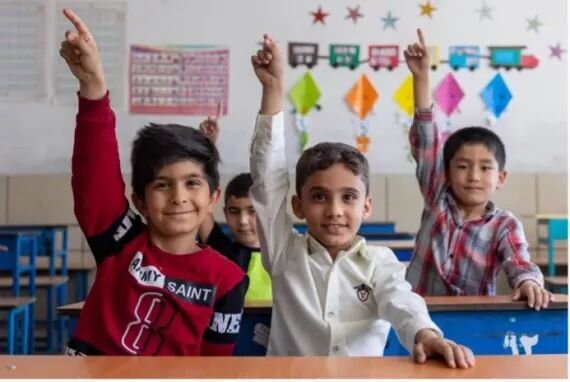UNICEF holds remedial classes for Afghan students in Iran

TEHRAN – The United Nations Children’s Fund (UNICEF) has held remedial classes for more than 1,500 students in six provinces of the country with high numbers of refugees.
The Ministry of Education, the Bureau for Aliens and Foreign Immigrants Affairs of the Ministry of Interior, and Relief International cooperated with UNICEF to implement the remedial classes program in the provinces of Fars, Isfahan, Khorasan Razavi, Semnan, Sistan-Baluchestan, and Yazd.
The program was supported by financial aid from the EU’s Civil Protection and Humanitarian Aid Operations (ECHO), the UNICEF website announced in a press release on December 27.
It helped the students, no matter whether Iranian or Afghan, who had fallen behind the school work for different reasons, such as not benefiting from pre-primary and schools’ readiness programs or COVID-19 pandemics, to cover their education gaps and catch up with their lessons.
Through UNICEF-supported remedial courses conducted from March to May 2023, each student received at least 30 hours of different subjects, including Persian, Mathematics, and Science.
Both Afghan and Iranian students enjoyed high-quality education in case of learning loss.
In addition, at the end of the course, each student received nutrition, hygiene packs, and stationery, to prepare them for the next academic year.
Recent services
The Ministry of Health and UNICEF cooperated to take necessary actions to combat malnutrition among vulnerable children in Yazd and Khorasan Razavi provinces.
Funded by the ECHO, the initiative provided 750 children under five, with essential nutrition supplies designed for the prevention and management of malnutrition in health facilities, the UNICEF website announced in a press release on November 19.
Also, 165 severely malnourished children benefited from therapeutic supplements in Yazd and Khorasan Razavi provinces’ hospitals.
With the improvement of the nutritional status of these children, UNICEF is now positioned to advocate for the widespread use of these supplies in less advantaged provinces and areas, the report added.
In addition, UNICEF plans to support the production of relevant domestic products to provide a sustainable solution to malnutrition-related challenges faced by communities in need.
Recently, the Iranian Red Crescent Society in cooperation with UNICEF organized eight educational workshops for students and their family members residing in the city of Khoy which was struck by a strong earthquake in January.
On January 28, an earthquake measuring 5.9 on the Richter scale hit Khoy in the northwestern West Azarbaijan province. The disaster affected at least 261,000 people and displaced 130,000 from their homes.
A total of 1,700 male and female students and 120 of their family members attended these workshops.
These educational workshops were held to empower children and their families in team building, team support, anger management, emotion regulation, empathy, happiness, self-care, and environmental care.
Facilitators of these workshops had earlier participated in a capacity-building training program organized jointly by UNICEF and the IRCS, funded by the ECHO, the UNICEF website announced in a press release on November 12.
Two pilot programs for the well-being and empowerment of young boys and girls have been launched in four provinces of the country.
Ministry of Sports and Youth and the Drug Control Headquarters in cooperation with UNICEF have implemented these programs in Kermanshah, Alborz, Isfahan, and Mashhad.
One program is for empowering adolescents and young boys and the other program is for girls' psycho-social health and their empowerment.
Soft and technical skills are taught to boys aged 15 to 24 in three UNICEF-supported centers located in Kermanshah, Alborz, and Isfahan provinces.
The centers provide different services including on-the-job training, internships, mentoring, psycho-social support, counseling, and social entrepreneurship programs.
The focus of this program is to facilitate a smooth transition from learning to earning, empowering 1,618 adolescents and youth in these provinces, the UNICEF website announced in a press release on November 13.
In the next step, with the expansion of this program, it will encompass the following provinces: Sistan-Baluchestan, South Khorasan, Khorasan Razavi, Kerman, and Hormozgan.
Some of these provinces have a significant number of Afghan refugee children and adolescents.
Simultaneously, the psycho-social well-being and empowerment centers for girls in the cities of Mashhad and Kermanshah have played an important role in addressing the psycho-social challenges of vulnerable adolescent girls in these provinces.
These centers are dedicated to preventing substance use and mitigating social harm among young girls, the report added.
A total of 2,023 adolescent girls and their families, 1,720 girls and 303 parents, have received support through a holistic approach which includes face-to-face meetings online outreach, and referral services.
After evaluating the results of these programs and enhancing the capacity of non-governmental organizations, these programs will be implemented in other provinces that face the challenge of illegal drug use.
MT/MG
